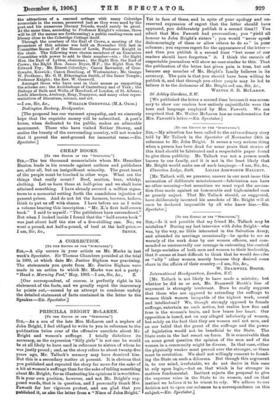[To THE EDITOR OP THE " SPECTATOR."]
SIR,—Is it not possible that my friend Mr. Tallack may be mistaken ? During my last interview with John Bright—who was, by the way, no little interested in the Salvation Army, and attended its meetings occasionally—he spoke to me so warmly of the work done by our women officers, and com- mended so unreservedly our courage in entrusting the control of large societies of both men and women to their leadership, that it seems at least difficult to think that he would describe as " silly " other women merely because they desired some share in the affairs of their country.—I am, Sir, &c.,
W. BRAMWELL BOOTH.
International Headquarters, London, B. C.
[Mr. Tallack is not likely to have made a mistake ; but whether he did so or not, Mr. Bramwell Booth's line of argument is strangely irrelevant. Does he really suppose that those who are opposed to extending the suffrage to women think women incapable of the highest work, moral and intellectual ? We, though strongly opposed to female suffrage, entertain no such notion, but realise how fine and true is the woman's brain, and how brave her heart. Our opposition is based, not on any alleged inferiority of women, but solely on the fact that they are women and not men, and on our belief that the grant of the suffrage and the power of legislation would not be beneficial to the State. The State rests in the last resort on force. It is conceivable that on some great question the opinion of the men and of the women in a community might be diverse. In that case, either the physically weaker must prevail over the stronger, or there must be revolution. We shall not willingly consent to found- ing the State on such a dilemma. But though this argument is, to our mind, irrefutable, we do not desire in this case to rely upon logic,—but on that which is far stronger in matters fundamental. Instinct rejects the proposal to give the supreme voice in the State to its women, and on that instinct we believe it to be wisest to rely. We adhere to our decision not to open our columns to a correspondence on this subjeot.—ED. Spectator.]


























































 Previous page
Previous page